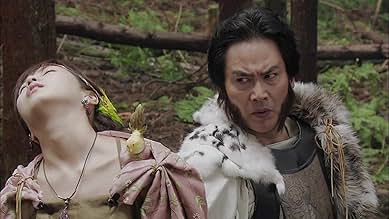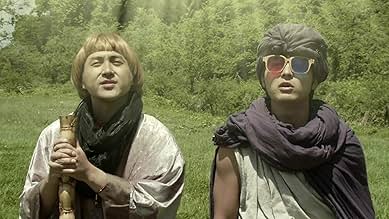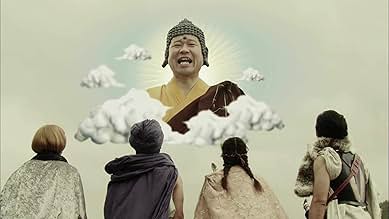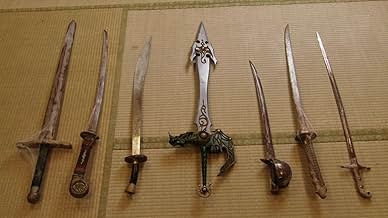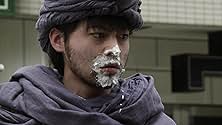Aggiungi una trama nella tua linguaA pure young man named Yoshihiko becomes chosen as a hero, and he sets out on a journey in order to save a village from a mysterious plague.A pure young man named Yoshihiko becomes chosen as a hero, and he sets out on a journey in order to save a village from a mysterious plague.A pure young man named Yoshihiko becomes chosen as a hero, and he sets out on a journey in order to save a village from a mysterious plague.
Sfoglia gli episodi
Trama
Lo sapevi?
- QuizThe show is heavily influenced and spoofs the Enix (now Square-Enix) role playing series Dragon Quest. Many monsters and series tropes appear in the series. The Hero Yoshihiko appearance resembles that of the hero from Dragon Quest V.
- ConnessioniFollowed by Yûsha Yoshihiko to Akuryô no Kagi (2012)
- Colonne sonoreEbo - Reboryushon
(opening theme)
Performed by mihimaru GT
Recensione in evidenza
I think a good way to describe this series is "Japanese Monty Python of RPGs", the satire being about RPG and hero stories clichés. It does it very well with its random takes.
In this series, there is the Buddha. Now, how one imagines him? Calm, composed, enlightened; his devotees, respectful ad dutiful. No.
The Buddha talks angrily after appearing in the sky and Yoshihiko can only see him with 3D glasses; the "instructions" and "directions" given to the heroes are vague and, of course, called out and questioned; the bandits that appear to fight the heroes are normal people with jobs or thugs with delusions of grandeur; conversations derail and get weird meanings thanks to bad delivery from the characters; people follow each other and contribute to "causes" based on petty desires.
However, all of this is satirized: the clueless of the hero who can only see "duty" until it blinds him to every other aspect of life and eventually gets constrained in it -- all a façade since neither he or anyone else actually knows his quest, and he succumbs too easily to carnal desires; the brawniness of the sidekick who can't solve anything that doesn't involve a fight; revengeful desires that only lead to thoughtlessness; the inefficiency of a mage without intelligence. All we would see "played straight" in a series is subverted.
The scenes also are not drawn out, meaning you never get tired of the segments since they all mean something different.
This is all done without much CG -- cheap practical effects all the way -- but when it's used, it's absolutely essential, such as when the Buddha appears or a little sparkle... sparkles.
Although an extensive knowledge of RPGs isn't necessary to appreciate this masterpiece, it can only be fully savoured with at least one hands-on experience with these games. In this case, a good 'subtitler' should put translator notes to help others navigate the series (I needed this a lot, thankfully I had the notes).
This is not a lengthy and well-thought review, it's more of an encouragement to appreciate this work.
In this series, there is the Buddha. Now, how one imagines him? Calm, composed, enlightened; his devotees, respectful ad dutiful. No.
The Buddha talks angrily after appearing in the sky and Yoshihiko can only see him with 3D glasses; the "instructions" and "directions" given to the heroes are vague and, of course, called out and questioned; the bandits that appear to fight the heroes are normal people with jobs or thugs with delusions of grandeur; conversations derail and get weird meanings thanks to bad delivery from the characters; people follow each other and contribute to "causes" based on petty desires.
However, all of this is satirized: the clueless of the hero who can only see "duty" until it blinds him to every other aspect of life and eventually gets constrained in it -- all a façade since neither he or anyone else actually knows his quest, and he succumbs too easily to carnal desires; the brawniness of the sidekick who can't solve anything that doesn't involve a fight; revengeful desires that only lead to thoughtlessness; the inefficiency of a mage without intelligence. All we would see "played straight" in a series is subverted.
The scenes also are not drawn out, meaning you never get tired of the segments since they all mean something different.
This is all done without much CG -- cheap practical effects all the way -- but when it's used, it's absolutely essential, such as when the Buddha appears or a little sparkle... sparkles.
Although an extensive knowledge of RPGs isn't necessary to appreciate this masterpiece, it can only be fully savoured with at least one hands-on experience with these games. In this case, a good 'subtitler' should put translator notes to help others navigate the series (I needed this a lot, thankfully I had the notes).
This is not a lengthy and well-thought review, it's more of an encouragement to appreciate this work.
I più visti
Accedi per valutare e creare un elenco di titoli salvati per ottenere consigli personalizzati
Dettagli
Contribuisci a questa pagina
Suggerisci una modifica o aggiungi i contenuti mancanti

Divario superiore
By what name was Yûsha Yoshihiko (2011) officially released in Canada in English?
Rispondi
